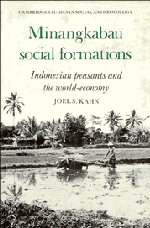Book contents
- Frontmatter
- Contents
- Lists of maps, figures and tables
- Preface
- Map
- 1 Introduction
- 2 The internal and the external in a Minangkabau village: an introduction to the world of the concrete
- 3 Adat, kinship and marriage: the constitution of the subsistence community
- 4 Agriculture and subsistence: the reproduction of the subsistence community
- 5 Commodity production in the village economy: the case of blacksmithing
- 6 Occupation, class and the peasant economy
- 7 The structure of petty commodity production
- 8 Mercantilism and the evolution of ‘traditional’ society
- 9 The emergence of petty commodity production
- 10 Conclusions: The concept of a neo-colonial social formation
- Bibliography
- Glossary of Minangkabau terms
- Index
- CAMBRIDGE STUDIES IN SOCIAL ANTHROPOLOGY
9 - The emergence of petty commodity production
Published online by Cambridge University Press: 29 September 2009
- Frontmatter
- Contents
- Lists of maps, figures and tables
- Preface
- Map
- 1 Introduction
- 2 The internal and the external in a Minangkabau village: an introduction to the world of the concrete
- 3 Adat, kinship and marriage: the constitution of the subsistence community
- 4 Agriculture and subsistence: the reproduction of the subsistence community
- 5 Commodity production in the village economy: the case of blacksmithing
- 6 Occupation, class and the peasant economy
- 7 The structure of petty commodity production
- 8 Mercantilism and the evolution of ‘traditional’ society
- 9 The emergence of petty commodity production
- 10 Conclusions: The concept of a neo-colonial social formation
- Bibliography
- Glossary of Minangkabau terms
- Index
- CAMBRIDGE STUDIES IN SOCIAL ANTHROPOLOGY
Summary
It is possible to trace the origins of the modern Minangkabau peasant economy to the period in which the commercial restrictions imposed under the Culture System were lifted and the economy of Indonesia as a whole was opened up to private capitalism. The main features of the peasant economy, which I have examined in previous chapters, must therefore be explained in terms of the transformation in the nature of Dutch colonial domination in the late nineteenth and early twentieth centuries on the one hand, and the existing social formation on the other. Specifically the predominance of petty commodity production must be explained with respect to the development of colonial capitalism and the existing social formation within which that development took place. The main features of that existing social formation have already been outlined. In the previous chapter I have shown that mercantile domination of the East Indies, first by the V.O.C. and then by the colonial government, generated processes of ‘traditionalisation’ and feudalisation within the Minangkabau social formation. These terms describe colonial encroachment on existing production processes and the preservation of apparently traditional forms of indigenous land tenure in an effort to prevent the emergence of a commercial peasantry.
- Type
- Chapter
- Information
- Minangkabau Social FormationsIndonesian Peasants and the World-Economy, pp. 172 - 199Publisher: Cambridge University PressPrint publication year: 1980



